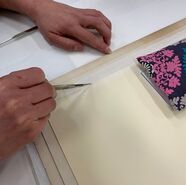
Since 1978, BACC has provided internships to 36 graduate and postgraduate students. BACC interns and fellows have gone on to hold positions in major museums in the United States and Europe such as the National Gallery of Art, the Metropolitan Museum of Art, the Art Institute of Chicago, the Getty Museum and Conservation Institute, the Centre de Conservation du Quebec and more; several have entered private practice.
Educational Training at All Levels
Pre-program (pre-graduate school) internship candidates must have completed course work sufficient to place the student within one year of qualifying for entrance into a conservation M.A. program. BACC invites academic institutions to inquire about pre-program training for undergraduate students eligible for course credit from their academic programs. While BACC has taken pre-program interns in the past, these positions are usually project based and not at any specific timeline.
Graduate students undertake a BACC internship as part of their masters degree coursework which requires summer and/or full year internship training. BACC offers Andrew W. Mellon Foundation funded internships for graduate students in conservation that typically run concurrently with the school year.
Postgraduate interns or fellows function as junior staff who gain experience both in collaboration with the conservators and on independent projects. However, work assignments, instruction, and research opportunities give the internship its educational focus. Postgraduate interns accepted into the program are awarded fellowship funding generously provided by the Andrew W. Mellon Foundation.
Selection Criteria
Interns or fellows are selected based on the following criteria:
- Assessment of the student’s level of experience and training and its appropriateness to the training BACC offers
- Identification of special study interests of the student and whether opportunities offered at BACC can accommodate them
- Evaluation of the types of projects best suited to the student's needs and whether the projected work inventory will constitute a good project pool for the student.
What's Involved
BACC internships and fellowships are designed to build upon a student's solid theoretical knowledge of conservation. Students are afforded a broad range of supervised and guided treatment experiences designed to develop practical knowledge and skill. Through work/practice, the student gains greater proficiency and experience in the areas of examination, treatment, and analyses. The range of work and activities common to a regional center affords students unique opportunities to broaden conservation expertise through experience in surveys of collections and in offering collection care guidance to institutions as well as private collectors. A unique educational aspect of the internship is the opportunity for the intern to engage in an independent, self-initiated research project.
As a self-contained conservation center, BACC has an institutional structure and physical layout that encourage a high level of interaction among professional staff. The nature of internships, particularly with respect to supervision during all phases of a treatment, requires close and regular interaction between the intern and their supervisor. Students are encouraged to discuss treatments with other BACC conservators and to share in communal professional discussions as part of their learning experience. Written evaluations are produced on a semi-annual basis.
Resources For Getting Started in Conservation
Conservators take many paths into the field but in the end, all will have extensive training in art, art history, science, and related subjects. The majority of today's conservators have a master's degree from a conservation graduate program.
If you are interested in the field of art conservation and/or wondering about how to become a conservator, there are several excellent resources available:
- Learn more about the field in general and the pre-program, graduate, post-graduate, and continued education stages of a conservator's educational path by visiting the American Institute for Conservation (AIC).
- The Emerging Conservation Professionals Network is another great resource as it assists with the transition from pre-program candidacy to graduate school and through to early career stages. They produce targeted programming and resources, foster a professional community for emerging conservation professionals (ECPs) through local networks and online platforms, and connect ECPs with educational and professional development opportunities. Check out the wiki page they have developed, here.
